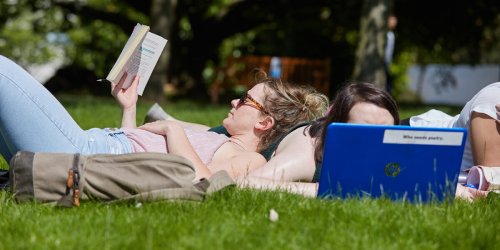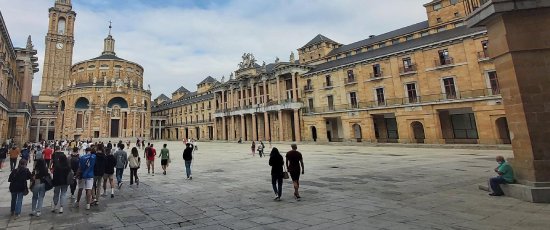Study abroad

Study abroad
Whether it’s a summer course, an online exchange or a year spent living, studying and working abroad, your linguistic competency and cultural knowledge benefit from nothing more than immersion in authentic target language.

Funding your year abroad
During the Year Abroad you will only pay 15% of your usual student fees. There are various grants to help finance you, and many placements come with an allowance or salary.
Multiple locations
It is possible, though not compulsory, to split the year in two and take contrasting placements in different locations in order to immerse yourself in more than one language and culture.
"On a year abroad you enter a melting pot – you become part of the international student community and you will meet people from all over the world, not just your host country... My year abroad has given me a newfound perspective of life and a newfound appreciation for home. I can’t recommend the opportunity enough or express what a privilege it is to be offered it!
Laeticia Junanto, Mathematics (MMath) with Study in Europe
What can I do on a year abroad?

University placement
Study full-time at a partner university in your chosen country.

Language assistantships
Work as a language assistant teaching English in a primary or secondary school.

Work placements
You may choose to spend your time working in your chosen country.
Where can I go on my year abroad?
French-speaking countries
- France
- The French West Indies (Martinique)
- Belgium
- Switzerland
- Canada
- Morocco
German-speaking countries
- Germany
- Austria
- Switzerland
Italian-speaking countries
- Italy
- Switzerland
Spanish-speaking countries
- Spain
- Argentina
- Colombia
- Chile
- Peru
- Puerto Rico
Study abroad FAQs
In the Autumn Term of your intermediate study year, you will be invited to information briefing sessions about studying and working abroad. We have long-standing exchange programmes with prestigious universities in a lot of countries around the world, located in Europe, South America, and Asia.
You have the choice between a study placement at a partner university (organised by SMLC), a British Council Teaching Assistantship (organised by the BC) and a work placement (students are responsible to find their own internships).
Unfortunately, we do not find work placements for your Year Abroad as these are student-negotiated (apart from British Council English Language Assistantships). We would recommend discussing this with your sectional Year Abroad Coordinator who may be able to provide help and advice about where to look for jobs and previous placements undertaken by students.
You can split your Year Abroad between countries and also different types of placements. For example, if you are studying French and German with Chinese, you can go to France for the first half and Germany for the second, and go to China during the summer for an intensive programme in Beijing and/or an internship in Xi’an. If you are very strong in French or German already and prefer to spend a longer time in China, we have semester long programmes in China.
Students who take part in a Year Abroad (study or work) are eligible for a reduced tuition fee, and you will not pay any tuition fee to your host university (as you are part of a reciprocal exchange programme). The tuition fee for your year abroad in 22/23 is charged at 15% of the fee for a standard year at Warwick.
The source of funding for students going on year abroad in 23/24 will be the Warwick Mobility Bursary of £600. For WP students on the Warwick Scholars programme and those in receipt of the Warwick Bursary they will instead receive a one-off payment of £1,200. One payment will be made whether students are undertaking a semester or a full year abroad.
You will need a visa if you travel on a British passport or any other non-EU passport.
It is the responsibility of the students to secure their own visa for studying / working abroad. The University can offer advice and support in regard to the application; however, we cannot apply for your visa on your behalf.
Warwick normally expects you to spend ca 8 months abroad. However, since the pandemic we have become more flexible.
Unfortunately, most partner universities in Europe are not able to provide accommodation for exchange students. Some universities provide accommodation databases with information on accommodation, but it is ultimately the student’s responsibility to arrange their own accommodation.
Students will have access to the University of Warwick wellbeing support services, and some exchange universities also provide a wellbeing service.
It is expected that most of your modules will be taken within the department to which you are affiliated but you can also take modules offered by other departments. Most of your modules should be taught in the language you study, however.
Yes. Your YA is a chance to design your own learning experience within the diverse possibilities of modules taught in the target language across different faculties in your host university.
The Year Abroad will enhance your language and inter-cultural skills immeasurably in addition to boosting your confidence and inter-personal skills (eg. being an effective communicator). It will also help you demonstrate an adaptability to new environment and cultures, making you an attractive candidate for future employers both UK-based and abroad.
During the pandemic it has been possible to go on a “Virtual Year Abroad” or do a blended Year Abroad. Although it might still be possible to blend your Year Abroad in specific cases, we currently strongly recommend face-to-face YA placements.
Yes. You can split your Year Abroad into two semesters and combine Study Placements within our broad offer of partner universities in Spain, Argentina, Chile, Colombia and Puerto Rico.
